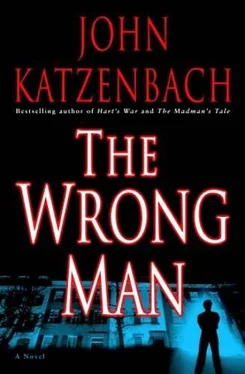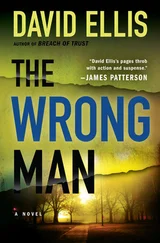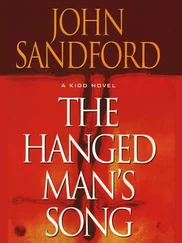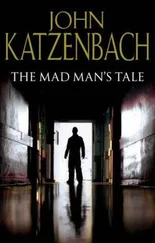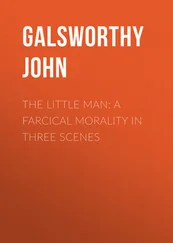“Well, then I won’t leave you alone,” Ashley said with a burst of false confidence. “We’ll both sit and wait together.”
Catherine shook her head. “Ah, Ashley, dear, that is most kind of you to offer. But I believe I would be far more comfortable waiting here, knowing that you were behind a locked door upstairs and out of the way. Regardless, the authorities should be here shortly, so let us be cautious and sensible. And sensible, right now, means please to do what I ask you.”
Ashley started to protest, but Catherine waved her hand.
“Ashley, allow me to defend my home in the manner I see fit.”
The impact of Catherine’s sturdy use of language was immediate. Ashley finally nodded. “All right. I’ll be upstairs. But if I hear anything I don’t like, I’ll be down here in a flash.” She wasn’t exactly sure what she meant by anything I don’t like.
Catherine watched as Ashley bounded up the single central stairway. She hesitated until she heard the distinctive sound of an old-fashioned key in a door lock clicking shut. Then she walked over to a small wood closet, built right into the wall next to the large open-hearth fireplace. Jammed behind fire logs in an old leather case was her late husband’s shotgun. She had not brought it out in years, not bothered to clean it in as long a time, and was not completely certain that the half dozen shells rolling free in the bottom of the case were still capable of being fired. Catherine imagined that there was about an equal chance that the old weapon might explode in her hands if she had to pull the trigger. Still, it was a large, intimidating weapon, with a gaping hole at the end of the barrel, and Catherine hoped that that might be all that was necessary.
She took the shotgun out and sat down hard in a wing chair beside the fireplace. She fed all six shells into the magazine, then cocked the weapon and sat back, waiting, the gun across her lap. The weapon was greasy, and she rubbed her fingertips against her slacks, smearing them with dark streaks. She didn’t know much about guns, although she knew enough to click the safety catch off.
Catherine rested her hand on the stock as she heard the first small sounds of movement, just beyond the windows, closing in on the front door.
She continued to stare out the window, and I could imagine that she was chewing over one thought or another, then she abruptly turned back toward me and asked, “Have you ever actually thought you could kill someone?”
When I hesitated before answering, she shook her head. “That’s probably the answer right there. Maybe a better question for you to consider is how we romanticize violent death.”
“I’m not sure what you mean,” I said slowly.
“Think of all the ways we express ourselves through violence. On the television, or in movies. Video games for kids. Think about all those studies that show that the average kid grows up witnessing how many thousands of deaths? Many thousands. But the truth is, despite all that education, when we are actually confronted by the sort of rage that could be fatal, we rarely know how to respond.”
I let her step away from the window and move back across the room to where she took a seat without replying.
“We like to imagine,” she said coldly, “that we will always know what to do in the most difficult of situations. But in reality, we don’t. We make mistakes. We fall prey to errors in judgment. All our flaws come flooding out. What we think we can do, we can’t. What we need to do is beyond us.”
“Ashley?”
She shook her head. “Don’t you think fear cripples us?”
A Conversation about Love
Catherine took a single deep breath and lifted the shotgun to her shoulder, tracking the sounds from outdoors. She counted the steps to herself. From the window, to the corner of the house, past the flowerpots arranged so carefully in a row, to the front door. He will try the front door first, she told herself. Although her tongue seemed swollen, she shouted out roughly:
“Just come on in, Mr. O’Connell.”
She did not have to add, I’m waiting for you.
There was a momentary quiet in which Catherine listened to her own labored breathing, which was nearly drowned out by the throbbing of her heart. She kept the shotgun lifted to her shoulder and tried to calm herself down as she sighted down the barrel. She had never shot anything in her life. Indeed, she had never fired a gun, even in practice. She had grown up a doctor’s daughter. Hope’s father had grown up on a farm and served as an enlisted man in the marines during the Korean War. Not for the first time, she wished he were at her side. After a second or two, she heard the front door open and a set of footsteps in the hallway.
“Right in here, Mr. O’Connell,” she spat out hoarsely.
There was nothing tentative in the sound of his steps as O’Connell came around the corner and stood in the entranceway. Catherine immediately leveled the shotgun, pointing it at his chest.
“Hands up!” She couldn’t really think of anything else to say. “Freeze, right where you are.”
Michael O’Connell neither stayed completely still nor did he raise his hands.
Instead, he took a small step forward and gestured at the weapon.
“You mean to shoot me?”
“If I have to.”
“So,” he said slowly, eyeing her carefully, then letting his vision sweep around the room, as if he were memorizing every shape, every color, and every angle. “What would make you have to?” He spoke as if they were sharing a joke.
“You probably don’t want to have me answer that,” she replied archly.
O’Connell shook his head, as if he understood, but disagreed. “No,” he said slowly, edging a little farther forward, “that’s exactly what I need to know, isn’t it?” He smiled. “Are you going to shoot if I say something you disagree with? If I move somewhere? If I get closer? Or if I step back? What will make you pull the trigger?”
“You want an answer? You can get one. Probably the hard way.”
O’Connell moved a step closer. “That’s far enough. And I would like you to raise your hands.” Catherine coughed out the words calmly, hoping that she sounded determined. But her voice felt flimsy and weak. And perhaps, for the first time, genuinely old.
O’Connell seemed to be measuring the distance between them.
“Catherine, right? Catherine Frazier. You are Hope’s mother, correct?”
She nodded.
“Can I call you Catherine? Or do you prefer something more formal. Mrs. Frazier? I want to be polite.”
“You can call me whatever you wish, because you aren’t staying long.”
“Well, Catherine-”
“No, I changed my mind. Make it Mrs. Frazier.”
He nodded, again as if there were a joke.
“Well, Mrs. Frazier, I won’t have to stay long. I would just like to speak with Ashley.”
“She is not here.”
He shook his head and grinned.
“I’m sure, Mrs. Frazier, that you were brought up in a proper household, and then later taught your own child how wrong it is to lie, especially directly to another person’s face. Lying to someone’s face makes a person angry. And angry people, well, they do terrible things, don’t they?”
Catherine kept the gun trained on O’Connell. She made an effort to control her breathing, swallowing hard.
“Are you capable of terrible things, Mr. O’Connell? Because, if so, perhaps I should just shoot you now and end this evening on a sour note. Mostly sour for you, however.”
Catherine had no idea whether she was bluffing. She concentrated hard on the man in front of her and did not have the ability to see much past the space between them. She could feel sweat dripping beneath her arms and wondered why O’Connell wasn’t acting more nervously. It was as if he were immune to the sight of the weapon. She had the unsettling thought that he was enjoying himself.
Читать дальше
